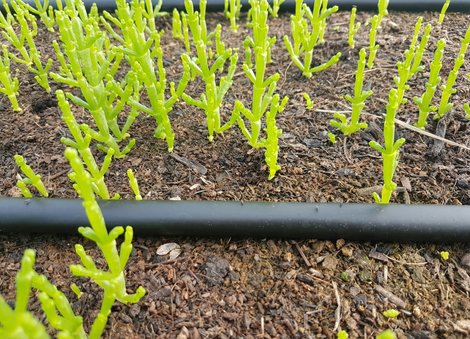Agriculturalist and Geologist Bring Halophyte Cultivation to Saxony-Anhalt
Salicornia: a salty, piquant vegetable for gourmets and the health-conscious

The 50-km radius around the state capital Magdeburg provides Ken Dohrmann and Julian Engelmann with all the resources they need to bring halophyte cultivation to Saxony-Anhalt: fine salt from Bernburg, brine from Staßfurt and residues from the potash mine in Zielitz. Dohrmann, an agriculturalist, and Engelmann, a geologist, founded Grow Up Salicornia GbR, converted a greenhouse in the town of Burg for cultivation experiments, established partnerships and investigated the various opportunities for processing and commercialization. The aim of the innovative “Halophytes from Saxony-Anhalt” project, which is funded by the EU and federal state as part of the EAFRD program, is to create an environmentally friendly, competitive cultivation strategy that is replicable and produces stable yields of this healthy delicacy.
Distinctive for its green color and crisp, salty and piquant flavor, Salicornia also goes by the names of samphire and sea asparagus; sophisticated gastronomy sets great store by it. Because the leafless succulents store dissolved salt and many different minerals in the water in their stems, restaurant-goers can enjoy the fresh, hand-picked tips served raw, when they are crisp and piquant, or blanched. As a herb-scented salt, dried and ground Salicornia offers a flavorsome alternative to table salt while helping to regulate blood pressure at the same time. It is low in sodium, rich in potassium, magnesium, calcium and iodine and contains fiber, vitamins and essential amino acids. Dried, ground Salicornia therefore has potential as an ingredient for bakers and manufacturers of chips and ready meals.
The halophyte thrives in coastal regions in particular and is well established as an ingredient and medicinal herb in Israel, the French Atlantic coast and the Dutch North Sea coast. In Saxony-Anhalt, halophytes such as Salicornia and sea asters are being grown in the salt marshes of the Salzstellen bei Sülldorf. In this nature reserve in the district of Börde, saltwater springs transform the Sülze stream, which up to that point carries freshwater, into a saltwater stream, making way for a rich world of halophytes.
“This shows us that succulents do well in this region when they are grown in saline soil or irrigated with salt water,” says Dohrmann. “What with the by-products from the potash mine in Zielitz, the rock salt mine in Bernburg and the brine springs in Staßfurt, which have remained unused until now, Magdeburg presents several economical opportunities to provide the plants with salt water,” adds Engelmann. They want to test all three salt sources as part of their cultivation experiments to see how they influence the Salicornia’s yield and quality. Dohrmann studied agricultural sciences and Engelmann geology. Their skills complement each other perfectly in this joint project.
In the town of Burg, 30 km away from Magdeburg, they found the ideal site: a nursery with 1,500 m2 of greenhouse space had just closed as there was no one to continue running it. The young entrepreneurs took out a lease on the property and then set about gutting and converting it. “The old nursery had bedding and balcony plants in pots on tables. We needed stable beds on the ground that we could fill with growing medium, however. The heating was inefficient, the pipes were rusty and we had to install a new, efficient irrigation system,” explains Engelmann.
In 2020, the entrepreneurial pair carried out preliminary studies to test the germination capacity of the seeds imported from the Netherlands, the optimal depth at which to plant the seeds in the soil, and substrate from different suppliers. They will use their findings to fine-tune their work in 2021. Dohrmann outlines how cultivation is due to start in the Burg greenhouse at the beginning of March, with the first harvest expected in the middle of May. “One of the things we are testing is sowing at different times and using different seed rates and substrates with varying salt content. We want to find out what conditions achieve what yields, how often we can harvest, how lignification develops the stems and how the different experiment variables affect taste and nutritional value.”
The two businessmen are also looking into how Salicornia cultivation can be mechanized most effectively. They plan to test, adapt and develop horticultural technology. Dohrmann and Engelmann want to perfect their greenhouse cultivation so that it can become a viable part of a competitive horticultural business – a niche that can deliver stable, high-quality yields as well as a stable income.
The EAFRD funding program, which comes to an end in 2023, is being supported by Dr. Joost Bogemans (from Serra Maris bvba in Belgium) and his expert halophyte knowledge. The halophyte specialist has carried out pioneering work in the field of agriculture, including the selection of Salicornia phenotypes that boast excellent yield and quality.
A working group from the Department of Food and Nutrition Sciences at Anhalt University of Applied Sciences in Bernburg is supporting the project’s work on processing, helping to investigate the special properties of the halophyte and its potential for use in different product groups. The Research Group for Marketing at the Otto von Guericke University Magdeburg is looking into who might be interested in the products, where these potential clients shop and what influences their purchasing decisions. The Martin Luther University Halle-Wittenberg is also involved, researching nutritional content such as vitamins.
“We want to be the region’s first Salicornia growers and to encourage farmers to focus more on resources that have so far not been used and on regional business cycles and niche products,” says Dohrmann. Sea asters and ice plant could also have huge potential for regional and seasonal gastronomy. “We’re going to try it out!”
Author: Bettina Koch/IMG Saxony-Anhalt

Find out more HERE: > Food industry in Saxony-Anhalt
